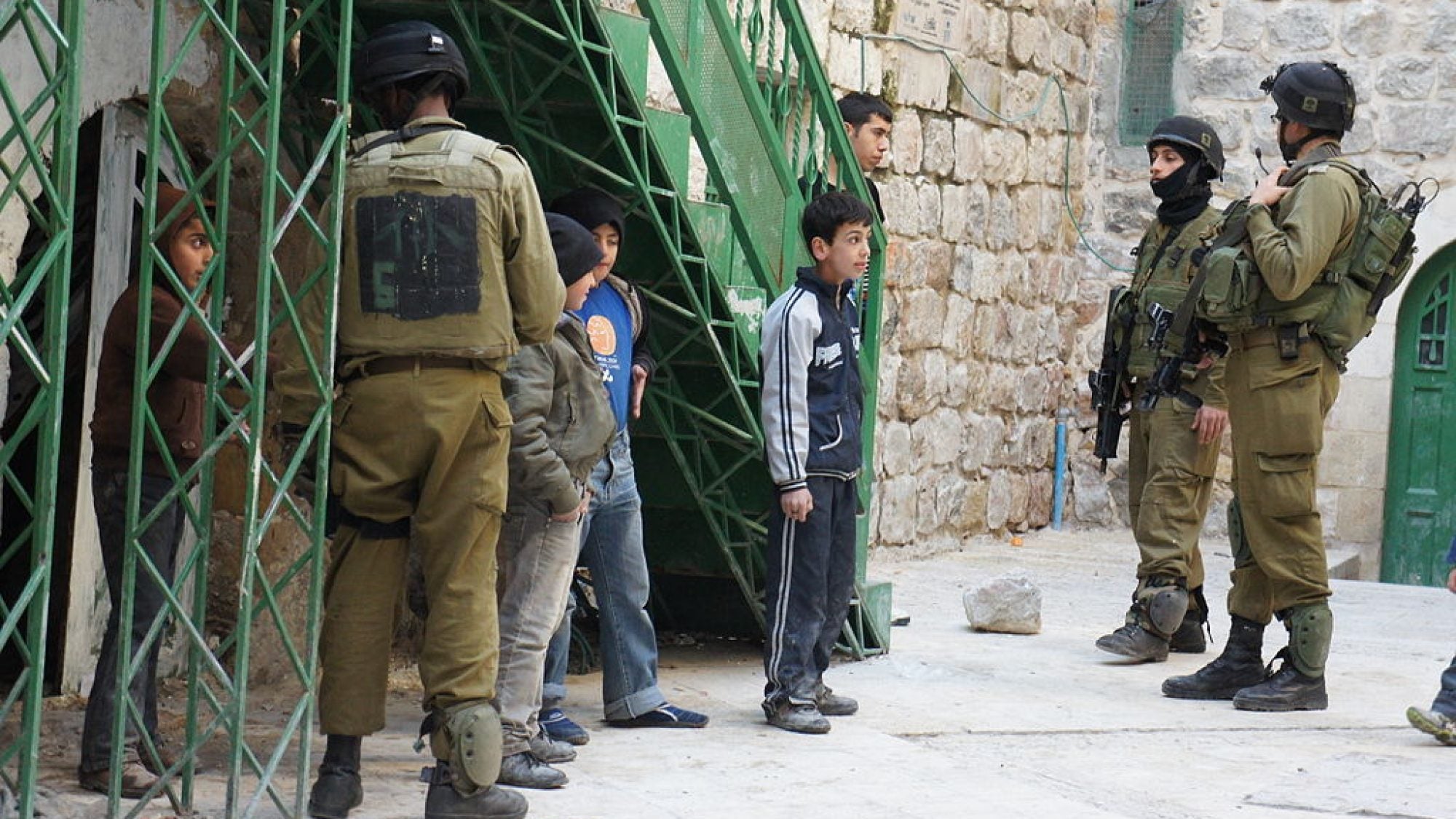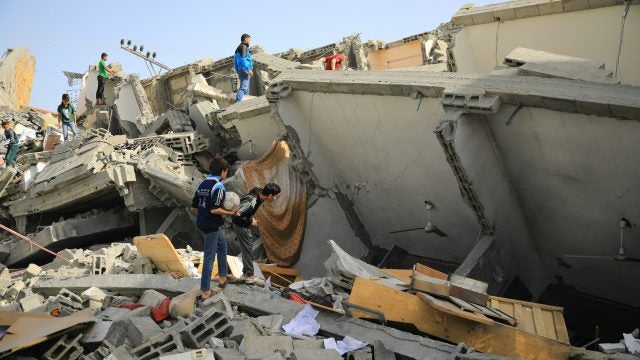
Title: Palestinian Children: Unlawfully Detained and Abused by Israel Defense Forces
Over the past ten years, Israeli forces have interrogated, prosecuted, and/or imprisoned over 7,000 Palestinian children within the Israeli military justice system. Despite international pressure, the number of arrests of Palestinian children has not at all subsided in 2013. In fact, it has increased by 17 percent compared to 2012, with around 480 children detained in March and April alone. These arrests—many of which occur in Palestinian cities in the West Bank such as Hebron, Bil’in, and Nablus—violate both Israeli and international law, especially the Convention on the Rights of the Child and the Convention against Torture and Other Cruel, Inhuman or Degrading Treatment or Punishment.
In a recently released statement, the Israel Defense Forces (IDF) attempted to justify the arrest of children by citing an increase in popular violence and rioting on the West Bank and the prevalent participation of minors in such riots. The common reason invoked for child detention by the IDF is object- or stone-throwing at a moving vehicle with the intent of harming it or the person traveling. This offense carries a maximum sentence of six months for twelve- and thirteen-year-olds, while fourteen-year-olds can serve a maximum of twenty years in prison.
Nevertheless, UNICEF reported in February 2013 that many of the IDF practices amount to cruel, inhuman, or degrading treatment or punishment according to the Convention on the Rights of the Child and the Convention against Torture. They also breach a 1999 decision of the Israeli Supreme Court, legally binding on Israeli military courts, which banned torture. Israel imposed military law on the occupied Palestinian territory in June 1967, with over 1,600 military orders on a wide range of issues being released afterwards. UNICEF stressed that “the common experience of many children is being aggressively awakened in the middle of the night by many armed soldiers and being forcibly brought to an interrogation centre tied and blindfolded, sleep deprived and in a state of extreme fear. Few children are informed of their right to legal counsel.” The IDF has tried to justify its night arrests by claiming that it aims to prevent large-scale riots that would aggravate the situation.
Testimonials from Palestinian children, however, corroborate these UNICEF conclusions. One seventeen-year-old boy shared with interviewer Samar Hazboun that the Israeli police picked him up after attacking his house at 2 a.m. with stun grenades and tear gas. The boy was dragged to a neighboring settlement where the soldiers beat him and swore at him. His account supports the UNICEF revelation that many children are subjected to ill treatment during their journey to the interrogation center.
The boy was not accompanied by a lawyer or family member, as required by article 37(d) of the Convention on the Rights of the Child, which stresses that “every child deprived of his or her liberty shall have the right to prompt access to legal and other appropriate assistance.” Although in 2011, Military Order 1676 raised the age of majority in the military courts from sixteen to eighteen years, Palestinian children are often sentenced based on their age at the time of the trial, not at the time when the offense was committed. During the interrogation, the boy was “handcuffed and blindfolded, as the interrogator electrically shocked him several times. He then grabbed his head and banged it against the wall until a second interrogator came in. The interrogator asked him to lie on the ground, and started to kick him until he lost consciousness.”
Most detained children are forced into confessions through a mixture of intimidation, threats, and physical violence. This confession is then used against them as the key piece of evidence during the court hearings, while bail is usually denied.
While Israeli children living in the settlements on the West Bank become criminally liable at age fourteen, because they are subject to civilian law, Palestinian children fall under Israel’s military law from age twelve and are often detained and interrogated before that age. This practice still occurs although international law specifies that no state shall be allowed to discriminate between people it has penal jurisdiction over on the basis of their race and nationality. During one of the recent cases of mass arrest of Palestinian children that took place in March 2013, eighteen of the twenty-seven children arbitrarily detained by the IDF were under age twelve.
After the Palestinian children are eventually released, the long-term consequences of their imprisonments are grave and extensive. Many of the detained children interviewed by Hazboun experienced trauma from abuses sustained during their arrests and detentions. They suffered from insomnia, involuntary urination, nightmares, depression, and fear of going out and facing people. The abused children rarely take legal action for fear of the potential repercussions that they or their families might face. In an NBC interview, a lawyer at Defence for Children International emphasized that many “end up leaving school or are recruited by the Israeli forces to collaborate with them following threats during investigations.”
The Israeli government hopes that by taking strong action against Palestinian children, it will prevent them from rioting in the future and resisting the Israeli occupation, as their parents are currently doing in a non-violent manner. The IDF must realize that it might be singlehandedly creating a generation of Palestinians that will feel strong animosity toward the Israelis and might find violence more effective than their parents’ non-violent struggle, because that is all they have seen coming from the Israeli side.
As detentions take children away from the outlet of education, and as the state of the Palestinian economy offers limited economic prospects, violence and fighting could become a form of release and solidarity for the Palestinian youth.
The Israeli government must put an end to the abuses it is committing against the Palestinian children. Such abuses are not only immoral but also illegal according to its own legislation, especially the 1999 Supreme Court ban on torture, and international standards. Children should be protected from conflict. Even in a violent context, they are entitled to their innocence and have the right to enjoy their childhood.
Image Credit: Friends123, CC0, via Wikimedia Commons
This is an archived article. While every effort is made to conserve hyperlinks and information, GJIA’s archived content sources online content between 2011 – 2019 which may no longer be accessible or correct.
More News

From the 1960s to the 1990s, the Danish government implemented the “Spiral Campaign,” a family planning policy that fitted four thousand and five hundred Inuit women and girls—many underage—with intrauterine…

This piece examines the UK government’s proscription of Palestine Action under the Terrorism Act, situating it within a broader trend of shrinking space for public dissent. It argues that the…

This article analyses the distortions of the International Humanitarian Law (IHL) notion of proportionality in the context of the Israel-Gaza war. It discusses Israel’s attempts to reinterpret proportionality to justify…